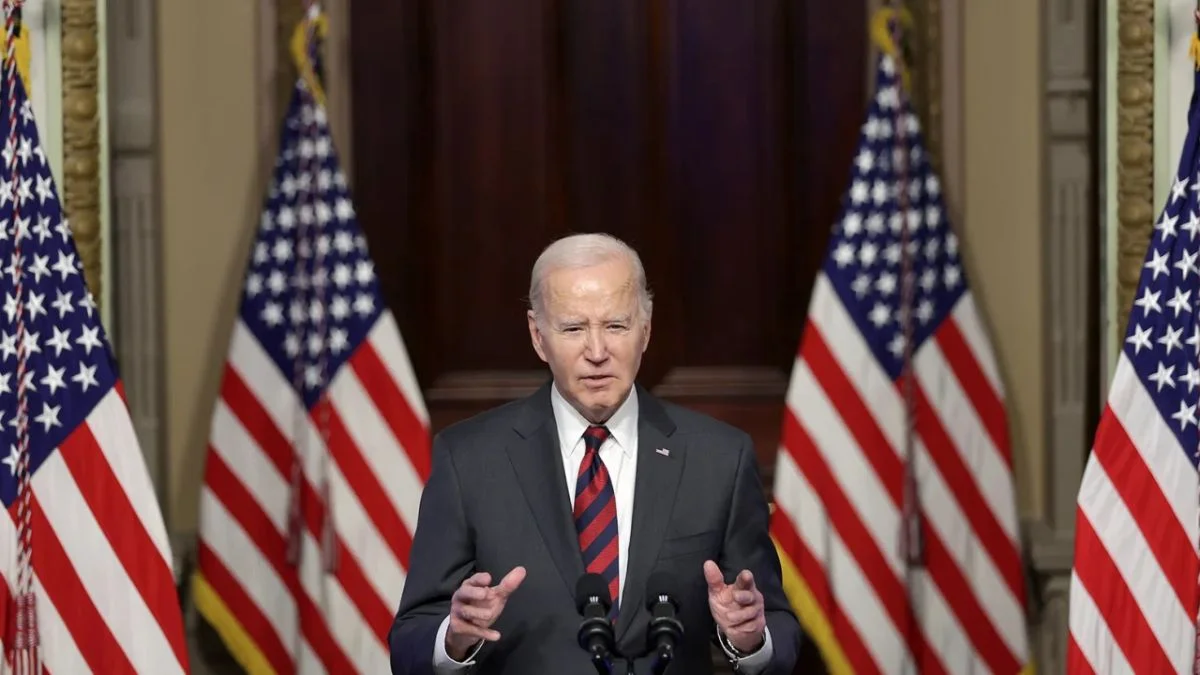The Biden administration, deeply involved in intense diplomatic efforts, faces strategic dilemmas and political headaches over the Israel-Hamas war despite granting a 48-hour extension to the truce.

The release of Palestinian prisoners, hostage releases, and humanitarian aid entering Gaza during these additional days validate these efforts. However, the situation remains delicate, and a resumption of fighting seems likely.
The most urgent question for the White House is the whereabouts of Americans. Despite expectations of at least three US citizens being released during the original four-day pause, only 4-year-old American-Israeli girl Abigail Edan emerged from Gaza, disappointing US officials.
While Israel signals openness to another extension, it also warns of a more intense offensive against Hamas once the truce ends. This heightened military action could result in increased civilian casualties, reminiscent of earlier instances in the war, including bombings of civilian areas and sieges on Gaza hospitals. Any political relief President Biden experiences domestically during the truce, amid deep divisions in his Democratic Party ahead of next year’s election, is unlikely to endure once air strikes resume.
There are increasing signs that President Biden’s effort to secure over $14 billion in aid for Israel is facing heightened uncertainty on Capitol Hill. The package has become entangled in controversies related to a larger Ukraine aid package and US southern border security. This situation underscores how the challenges in domestic politics are significantly hindering Washington’s ability to effectively pursue its foreign policy goals.
The administration’s firm warnings to its adversaries have, until now, assisted in containing the conflict, but concerns about regional escalation remain high. The risks for US personnel were emphasized when American officials reported on Sunday that two ballistic missiles were launched from Houthi rebel-controlled Yemen toward a US warship in the Gulf of Aden.
The missing Americans
US officials closely monitored Hamas’ release of another 11 hostages on Monday, the final day of the original truce deal. They were particularly attentive because they had hoped that two American women, abducted during the Hamas terror attacks on October 7, would be freed. Unfortunately, the two Americans did not emerge, leading officials to pin their hopes on the possibility of their release in the extended releases planned by Hamas over the next two days.
“It’s challenging to determine how they compile these lists,” said National Security Council spokesman John Kirby in a Monday interview with CNN’s Wolf Blitzer. “We certainly hope that in the next two days, in the upcoming releases, we will see some Americans come out.”
Yehuda Beinin, whose daughter Liat Beinin, 49, is one of the two American women with dual Israeli citizenship, expressed deep concern for her and her husband Aviv Atzili, who is also believed to be a hostage. “We have no choice but to remain hopeful,” he told CNN’s Erin Burnett.
The administration is grappling with a serious issue as it remains uncertain about the number of Americans being held in Gaza and whether those suspected to be captive are still alive. National Security Council spokesman John Kirby addressed reporters at a White House briefing, stating, “We think the number is less than 10, probably in the neighborhood of, you know, about eight to nine. But we don’t necessarily have firm, solid information on each and every one of them.”
Another complication is that 40 hostages are believed to be held not by Hamas but by other Palestinian militant groups, including Islamic Jihad, according to a diplomatic source. It cannot be known for certain whether Americans are among those held by these groups.
On Monday, a senior administration official stated that the White House does not believe, “so far,” that Hamas purposefully held back two American women whom the US had hoped would be freed as part of Hamas’ release of 50 hostages over the four-day truce.
So far, the focus of hostage releases has been on women and child captives, and there is limited optimism for the immediate release of young male hostages. Experts suggest that Hamas leaders may perceive young males as a more valuable bargaining tool, aiming to increase the price for their release. Currently, the exchange ratio is three Palestinians freed from Israeli jails for one captive from the October 7 attacks, with Israel not releasing any males over the age of 18. The uncertainty about the fate of male hostages is heightened by the possibility of a resumption of fighting if truces are not extended indefinitely. This situation is particularly distressing for members of the Israeli armed forces who were captured.
Rachel Goldberg’s 23-year-old son, Hersh, was severely wounded and abducted by Hamas during the Nova Music festival attack. She informed CNN’s Jake Tapper on Monday that none of the released hostages had been able to provide any information about his whereabouts or condition. Goldberg expressed deep concern, stating, “We’re very, very worried. We feel like the clock is ticking, time is ticking. Here is this extremely wounded young man, an American civilian, and we’re worried like any parent would be.”
Security experts believe that it’s probable that Hamas recognizes the potential for increased leverage by holding onto US hostages. This includes the possibility that such hostages could lead to heightened American pressure on Prime Minister Benjamin Netanyahu to extend a pause. This pause has provided Hamas fighters with time to regroup after ongoing Israeli strikes and to prepare for a resumed operation that is still anticipated to unfold.
The return of lawmakers to Washington this week after the Thanksgiving break is expected to intensify domestic pressure on President Biden to secure the release of Americans held captive in Gaza, particularly from Republicans aiming to portray him as weak. GOP Sen. Tom Cotton of Arkansas remarked on Fox on Sunday, “Apparently, Hamas is so contemptuous of President Biden and American power that they feel the imperative to release Filipinos and Thai hostages before they release American hostages.”
When the fighting begins again
Hostage releases and humanitarian aid shipments into Gaza, as stipulated in the original deal, have provided crucial relief to Palestinians. However, there is a widespread understanding that the truce is unlikely to be permanent. US efforts to extend the pause are becoming more pronounced. Officials announced on Monday that Secretary of State Antony Blinken would return to the region this week, with planned stops in Dubai, the West Bank, and Israel.
If hostilities resume, Israeli operations are expected to target areas such as densely populated southern Hamas strongholds and crowded refugee camps. This raises the likelihood of significant civilian casualties and a subsequent international backlash against Israel. President Biden has already experienced political challenges from such operations, both internationally from US allies and domestically from key demographics, including young, progressive, and Muslim American voters crucial for the upcoming election. According to a Washington Post report, even his own staff may have concerns. The likelihood, therefore, is that he will face a similar or potentially more intense political challenge when the conflict reignites.
Biden has found himself isolated on this issue from many American and foreign leaders and officials who would typically be considered political allies. This situation raises the question of whether he will shift from his firm refusal to call on Netanyahu to observe a permanent ceasefire, a move that could impact Israel’s efforts to weaken Hamas.
Fears of escalation
Presidents seldom receive credit for averting disasters that never materialize. However, the Biden administration can assert a significant achievement thus far in preventing the conflict from escalating into a full-fledged regional war. This success is attributed to stern warnings to traditional adversaries and displays of military force, including the deployment of two aircraft carrier groups to waters near Israel.
While US adversaries like Iran have not yet actively engaged in the conflict, and escalation has been avoided thus far, the administration must maintain constant vigilance.
A concerning sign of risks emerged when two ballistic missiles fell within 10 nautical miles of the USS Mason, a guided-missile destroyer in the Gulf of Aden that responded to an attack on a tanker by suspected Somali pirates, as per US officials. The missiles were fired from areas controlled by Houthi rebels in Yemen, a Shia group previously supported by Iran. Houthis have launched numerous attacks against US interests in the region and Israel since the October 7 Hamas assault. The USS Mason did not attempt to shoot down the missiles, and the Pentagon has not confirmed if the vessel was specifically targeted.
Mark Esper, the former defense secretary in the Trump administration, cautioned against viewing the incident as a coincidence. He expressed concern about what he perceives as an insufficient response from the current administration to attacks by Iranian proxies in Iraq, Syria, and other regions. Esper shared these views with CNN.
He added, “I know they are concerned — they fear that if they do too much, it will escalate. My argument is just the opposite. If they don’t do enough, the attacks will continue, and at some point, Americans will be killed, and that’s when it will escalate.”











